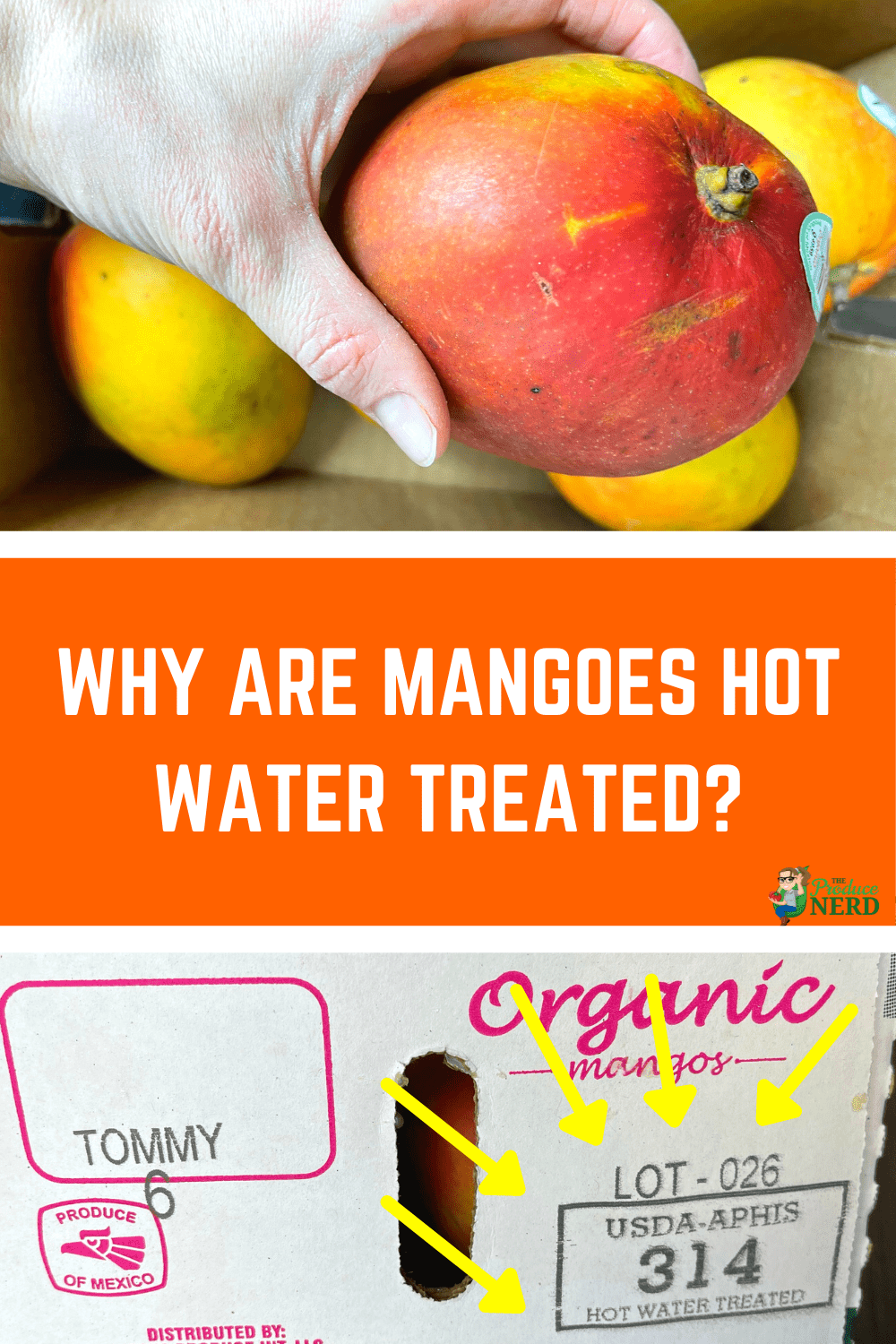Ever since I started learning about food ingredients, I have been obsessed with reading product labels. In the case of mangoes, when they are bought individually, there are no labels. However, when bought in bulk boxes, such as the mangoes from Costco, there is an extra label on the box that you do not see on other types of fruit packaging. The extra label indicates that the mangoes were “USDA APHIS treated with hot water.” So, what is a mango hot water treatment?
Table of Contents
Why Are Mangoes Hot Water Treated?
Mangoes consumed in the United States are imported from 6 main Latin American countries: Mexico, Ecuador, Peru, Brazil, Guatemala and Haiti. Mangoes are produced in tropical regions, where issues with fruit flies can occur. In order to prevent the fruit flies from entering the United States, some form of quarantine is required for the fruit to be allowed entry (regardless of whether they are organic or conventional). The most common form of quarantine currently used on mangoes imported into the United States is a hot water treatment. Hot water treatment has been used since the method was approved in 1987 and is the most cost-effective method.
How Are Mangoes Hot Water Treated?
Mangoes are dipped into hot water measuring at least 115°F (46.1ºC) to increase the pulp (interior of the fruit) temperature, and the length of time in the water is determined by the cultivar type and size of the fruit. The hot water that is used in the treatment needs to include a chlorine sanitizer.
After going through the hot water treatment, the mangoes are required to wait for 30 minutes prior to any cold storage or hydrocooling, unless an extra 10 minutes is added on to the hot water treatment. After treatment, the mangoes are transferred to an insect-free zone in the facility and need to stay there until they are removed from the facility in insect-free containers. Options for keeping the fruit flies out of the insect-free areas include window screen, mosquito netting, solid walls (made of glass, concrete, drywall or wood), and machines that create high velocity wind. (You can read additional details of this process from the Federal Register.)
APHIS is the Animal and Plant Health Inspection Service, which is the USDA agency responsible for protecting plant and animal health, and animal welfare. In this case, APHIS is in charge of keeping all foreign pests from entering the country. All facilities that perform the hot water treatment must be approved by APHIS prior to labeling the boxes and shipping the treated fruit to the United States. In addition to the label on the box, there is a number that represents the designated facility where the mangoes were hot water treated. In the example below, the facility identification number is 351.
Potential Issues With Mango Hot Water Treatment
The main issue that is caused by hot water treatment is that it can affect the fruit quality. However, this can be combated by the facility implementing better practices, such as more efficient cooling systems used after the hot water treatment, proper storage and shipment temperatures, and ensuring sufficient amounts of chlorine sanitizer are included in any wash steps that take place after the hot water treatment, etc.
Mango Hot Water Treatment Alternatives
Alternatives to the mango hot water treatment that are still being researched include:
At the end of the day, these alternatives need additional research before they can be implemented commercially and the hot water treatments are still the most cost-efficient method, so if the operations can maintain fruit quality, it is still the best option for them.
If you enjoyed this post, you might also like:
- Why is Sulfur Dioxide Applied to Grapes?
- What is Ethylene & How is it Used?
- How Fruit & Vegetables Become Infected with Diseases
Resources:
“Alternatives to Hot Water Treatment.” National Mango Board. Web. 1 Oct 2016.
Mitcham, E. and Yahia, E. Alternative Treatments to Hot Water Immersion for Mango Fruit. Report to the National Mango Board. 2009. 50 pages.
“Treatment Manual.” United States Department of Agriculture. Nov 2015. Web. 1 Oct 2016.

Thank You very much for this.
Does hot water ripen fruit to some degree?
Sam
Does hot water ripen the fruit?
With the sanitizer is the fruit still considered ORGANIC??
Very cool, thank you!